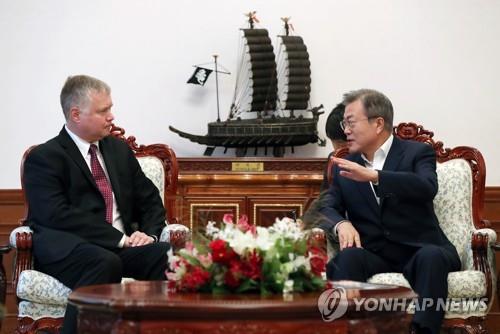- California Assembly OKs highest minimum wage in nation
- S. Korea unveils first graphic cigarette warnings
- US joins with South Korea, Japan in bid to deter North Korea
- LPGA golfer Chun In-gee finally back in action
- S. Korea won’t be top seed in final World Cup qualification round
- US men’s soccer misses 2nd straight Olympics
- US back on track in qualifying with 4-0 win over Guatemala
- High-intensity workout injuries spawn cottage industry
- CDC expands range of Zika mosquitoes into parts of Northeast
- Who knew? ‘The Walking Dead’ is helping families connect
Biegun: Let’s seize chance to achieve denuclearization
The new U.S. special envoy on North Korea said Tuesday it’s important to maintain the momentum of dialogue with North Korea despite some difficulties.
“We have some hard work to do,” Stephen Biegun said at the outset of talks with South Korea’s top nuclear envoy Lee Do-hoon in Seoul.
“But we also have a tremendous opportunity” created by back-to-back summits among the leaders of the U.S. and the two Koreas, he added. “We need to do everything we can to make the most of this moment of opportunity.”
Biegun, appointed as the State Department’s special representative for North Korea late last month, mentioned a proverb saying, “The beginning is half done.”
“And this is the beginning,” he added. “So what we need to do is to finish the job.”
Lee agreed that the allies are faced with both challenges and opportunities in efforts for denuclearization and a peace regime on the peninsula.
Speaking to reporters after their meeting, Lee said they had “in-depth” discussions on a related strategy.
“We agreed about how important South Korea-U.S. coordination is in such a process,” he said.
Biegun said the two sides have a “very strong working relationship.”
“I’m looking forward to achieving this process successfully, working closely with our friends and allies here in South Korea,” he said.
The officials did not take any questions from the media.
Later in the day, Biegun, a former Ford Motor Company executive, paid a courtesy call to President Moon Jae-in.
Moon asked him to achieve “successful results” from denuclearization talks by capitalizing on the emerging mood for dialogue between Washington and Pyongyang.
The president also pledged to ensure that his government will play “all possible roles” during the denuclearization efforts, while noting the need for “large-hearted” talks to overcome decadeslong hostility and distrust between the U.S. and the North.
Biegun said in response that he would do his best for progress in denuclearization and the establishment of peace on the peninsula, Moon’s office said.

South Korean President Moon Jae-in talks with Stephen Biegun, the State Department’s special representative for North Korea, at his office Cheong Wa Dae in Seoul on Sept. 11, 2018, in this photo provided by Cheong Wa Dae. (Yonhap)
Earlier in the day, Biegun also paid a courtesy call on Foreign Minister Kang Kyung-wha.
In a meeting later in the day with Unification Minister Cho Myoung-gyon who handles relations with North Korea, Biegun expressed his support for South Korea’s efforts to deepen inter-Korean relations.
“I very much share your resolve that we need to find a path way to the future on the Korean Peninsula that allows inter-Korean relations to deepen as much as possible,” he said..
He arrived here Monday as part of his first Northeast Asia tour as the special representative that will also take him to Beijing and Tokyo.
It comes amid talk of another summit between the North’s leader Kim Jong-un and U.S. President Donald Trump.
Kim sent a “very warm, positive” letter to Trump requesting the follow-up meeting to their Singapore talks on June 12, according to White House press secretary Sarah Huckabee Sanders.
“We are open (to it) and already in the process of coordinating,” she said at a press briefing.
National Security Advisor John Bolton also said at a forum in Washington, D.C. that the possibility of another summit with the North “obviously exists.”
He stressed, however, that the Trump administration is waiting for Pyongyang to take steps to denuclearize.
South Korean President Moon Jae-in plans to visit Pyongyang next week for his third meeting with Kim, followed by the U.N. General Assembly session in New York late this month.
Moon is scheduled to hold a separate meeting with Trump on the sidelines of the annual event.
It’s not confirmed whether the North’s leader will attend it.
Talking with Biegun, Seoul’s top diplomat pointed out there’s a series of important diplomatic schedules this month, her ministry said in a press release.
Kang was quoted as saying it’s necessary to pull off “substantive progress” on the basis of the robust alliance.
The left-leaning Moon administration has endeavored to create a virtuous cycle of moving forward denuclearization and improving inter-Korean relations.
Kang’s ministry said later its officials used Biegun’s visit as a chance to help the U.S. side better understand Seoul’s plan to open an inter-Korean liaison office in the border town of Kaesong.
The government is preparing to hold the launch ceremony on Friday amid reports that the Trump administration is concerned about possible negative impact on U.N.-led sanctions on Pyongyang.
“South Korea and the U.S. have constantly consulted each other on the opening of the liaison office,” spokesman Noh Kyu-duk said at a press briefing.
The meetings between the South Korean diplomats and Biegun are believed to have served as a good opportunity to deepen “understanding” on the matter, he added.
Noh’s comments suggest that Washington has okayed the establishment of the formal communication channel that has been delayed for weeks.
Biegun reportedly plans to travel to Seoul again on his way back home after regional trips later this week.











